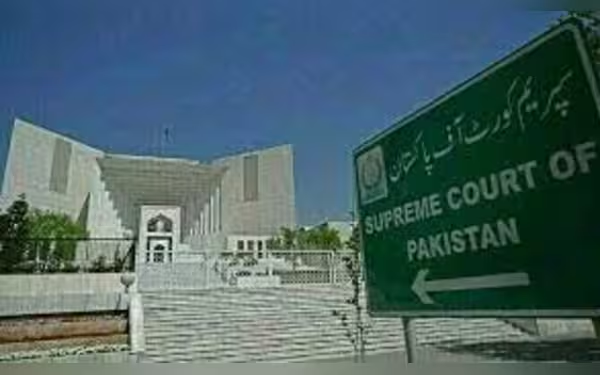Saturday, November 16, 2024 05:37 PM
Supreme Court Reaffirms Suo Motu Authority Post 26th Amendment
- Supreme Court can take suo motu notice after 26th amendment.
- Justice Mazhar emphasizes careful handling of significant cases.
- Court addresses corruption and financial misconduct proactively.
 Image Credits: thefrontierpost
Image Credits: thefrontierpostSupreme Court of Pakistan reaffirms suo motu authority post 26th amendment, addressing significant legal issues and corruption.
In a significant development, the Supreme Court of Pakistan has reaffirmed its authority to take suo motu notice in legal matters, even after the implementation of the 26th amendment. This clarification was made by Justice Muhammad Ali Mazhar during a recent hearing of a terrorism case. The constitutional bench, led by Justice Aminuddin, convened to address various pressing issues, demonstrating the court's ongoing commitment to uphold justice and accountability.
The six-member bench, which included notable justices such as Jamal Mandokhail and Hassan Azhar Rizvi, resumed its proceedings on a Friday, focusing on the implications of the suo motu notice. Justice Mazhar emphasized that while the Supreme Court retains the power to intervene in significant cases, such matters will now be addressed specifically by a constitutional bench. This decision underscores the court's dedication to ensuring that critical issues are handled with the utmost care and legal scrutiny.
During the session, the bench also dealt with other important cases, including appeals under the Banking Ordinance and the service structure of Lady Health Workers. The court disposed of the Al-Jihad Trust vs Federation case, citing its ineffectiveness. Furthermore, the bench examined a case concerning secret foreign bank accounts and the recovery of looted funds. Lawyer Hafiz Ehsan highlighted ongoing legal proceedings related to these accounts, prompting Justice Mazhar to request reports from the Federal Investigation Agency (FIA) and the Federal Board of Revenue (FBR).
Justice Mazhar's remarks were pointed, as he urged the FBR's lawyer to expedite the submission of a report to facilitate the resolution of the case. The court's directive to the FIA and FBR to provide updates on foreign bank accounts reflects a proactive approach to tackling corruption and financial misconduct.
Additionally, the constitutional bench addressed the issue of the private use of the Islamabad Convention Center. Justice Aminuddin noted that the attorney general might have settled any outstanding dues related to this matter. Justice Mazhar pointed out that a notice had also been issued to a former prime minister in connection with this case, highlighting the high-profile nature of the proceedings. The additional attorney general requested time to gather necessary information, to which Justice Aminuddin responded by instructing him to keep the bench informed.
The hearings were adjourned for two weeks, allowing time for the relevant parties to prepare their reports and responses. This period will be crucial for ensuring that all necessary information is presented to the court, enabling it to make informed decisions.
The Supreme Court's recent actions reflect its unwavering commitment to justice and accountability in Pakistan. By asserting its authority to take suo motu notice, the court is sending a clear message that it will not shy away from addressing significant legal issues, regardless of the political implications. As the hearings continue, the public will be watching closely, hoping for transparency and fairness in the judicial process. The outcomes of these cases could have far-reaching implications for governance and the rule of law in the country.













